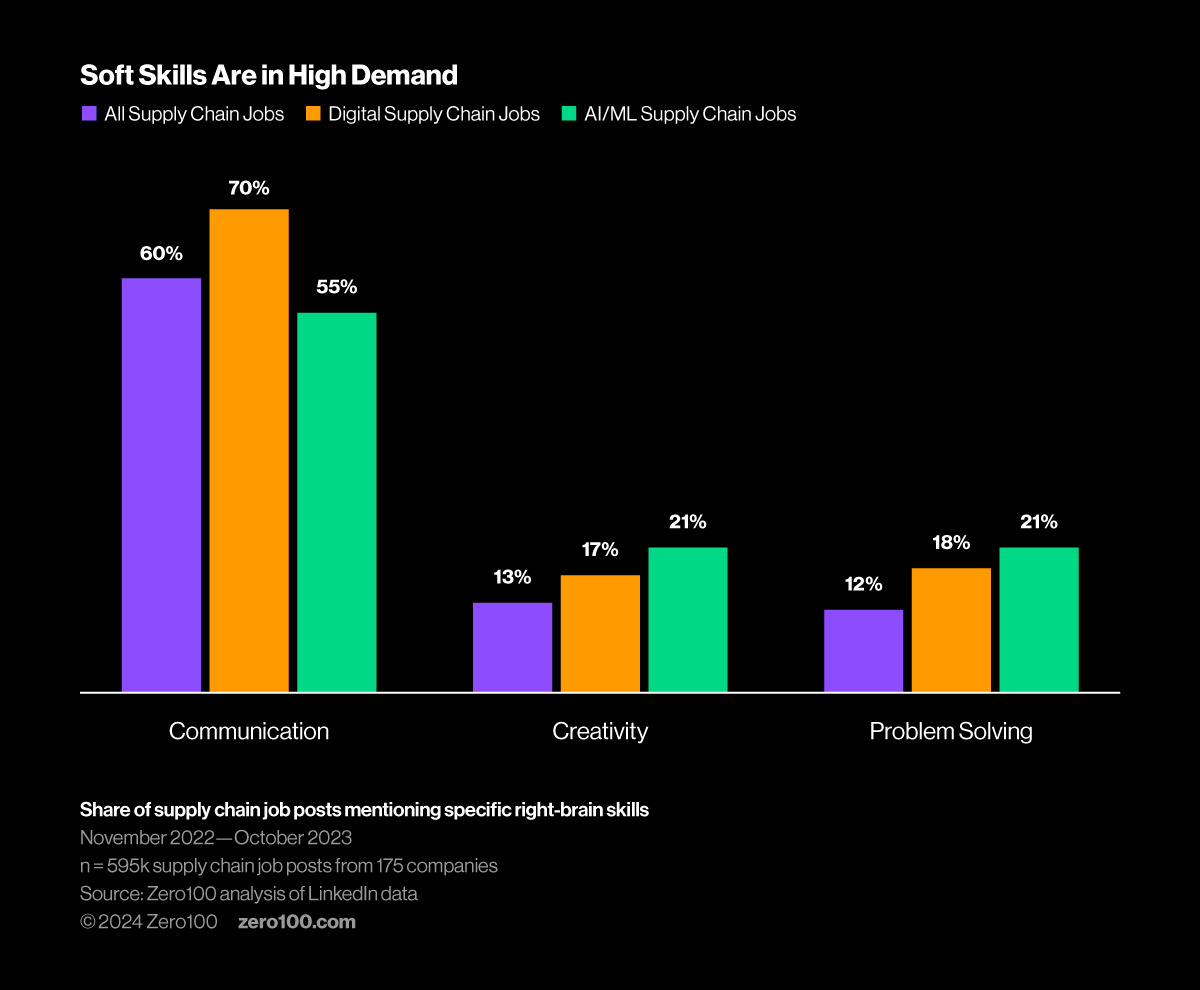

Digital Transformation Requires Right-Brain Skills
Zero100 research suggests that right-brain skills are as essential as technical skills because they allow leaders to build a strong organizational foundation upon which key digital initiatives can thrive.
Key Takeaways
-
1
Communication skills are by far the most sought-after soft skill in supply chain job posts, required in 47% more posts than creativity, the second most required soft skill.
-
2
Soft skills are more likely to appear in supply chain job posts that also mention digital skills. For example, “problem solving” (a soft skill) appears in 12% of all supply chain job posts but 21% of supply chain job posts that mention AI/ML (digital skills).
To stay ahead of the curve on digital innovation, companies are prioritizing hiring for technical skills. But this brings up a critical question… what is the best approach when it comes to integrating this new talent into existing teams? Change management is part of it. The other is ensuring you have the right mix of skills among old and new talent to bridge any gaps in capabilities. Zero100 research suggests that right-brain skills are as essential as technical skills in that they allow leaders to build a strong organizational foundation upon which key digital initiatives can thrive.
To assess how organizations are approaching hiring for right vs left brain skills and if they are doing so in an integrated way, we looked for how often companies require three of the most in-demand soft skills – communication, creativity, and problem-solving – in supply chain job posts. We found that, in many cases, soft skills are prioritized over technical skills. For example, creativity and problem-solving are listed in 13% and 12% of supply chain job posts, respectively – more than double the mentions of core digital skills like AI, ML, blockchain, and automation, all of which are mentioned in 5% of supply chain job posts.
Looking more granularly at digital supply chain jobs (which we define as supply chain job posts listing the word “digital” and/or including mentions of digital skills) and supply chain job posts listing “AI/ML,” we found that soft skills appear more in these roles than in supply chain roles overall. For example, problem-solving is required in 12% of overall supply chain jobs but almost 18% of digital supply chain jobs. When paired with AI/ML skills, the number of mentions of soft skill keywords – notably communication, problem-solving, and creativity – ticks up even further. Problem-solving is required almost ten percentage points more in AI/ML supply chain jobs compared to all supply chain job posts. Communication stands out as the most sought-after skill – it is called out in 60% of all supply chain jobs, 70% of digital jobs, and 55% of AI/ML jobs.

What these insights show us is that companies don’t just want AI experts, they want creative problem solvers, prompt engineers, and people who think outside of the box. Citizen technologists, who sit between business and IT as a translator, are just that. With a mix of technical and soft skills, citizen technologists can be recruited by targeting hiring to include specific right and left-brain skills in job posts… and they can also likely be found already in your organization, which means they can also help upskill your current team.
You can also create upskilling opportunities through curricula and cross-functional partnerships. Walmart, for example, has partnered with an online learning platform called Springboard to offer tailored tech programs for associates to learn skills in data analytics, software development, and data-driven strategic thinking. The results of upskilling in ways like this will be a wider organizational dispersion of tech knowledge, better application of tech to the business, and robust teams equipped to lead efficient digital transformations.
To successfully implement and optimize innovative solutions and reap the benefits of investments (and fast), recruiting or upskilling with a focus on right-brain competencies within supply chain talent – from most junior to the most senior – is a game changer. For more data, findings, and recommendations, read our research report, Rewired 2030 – Digital & Talent Strategies for Chief Supply Chain and Operations Officers.
To see a different data cut or to dig deeper into this topic, reach out to our Head of Research Analytics, Cody Stack, at Cody.Stack@zero100.com.
Methodology
Zero100’s proprietary data and analytics are a combined effort between our data scientists and research analysts. We provide data-first insights matched with our own research-backed points of view and bring this analysis to life via real-world case examples being led by supply chain practitioners today.
For this study, we looked at 595k supply chain LinkedIn job posts from 175 B2B and B2C companies. Our analysis categorizes listings based on mentions of specific digital skills within job titles and descriptions.